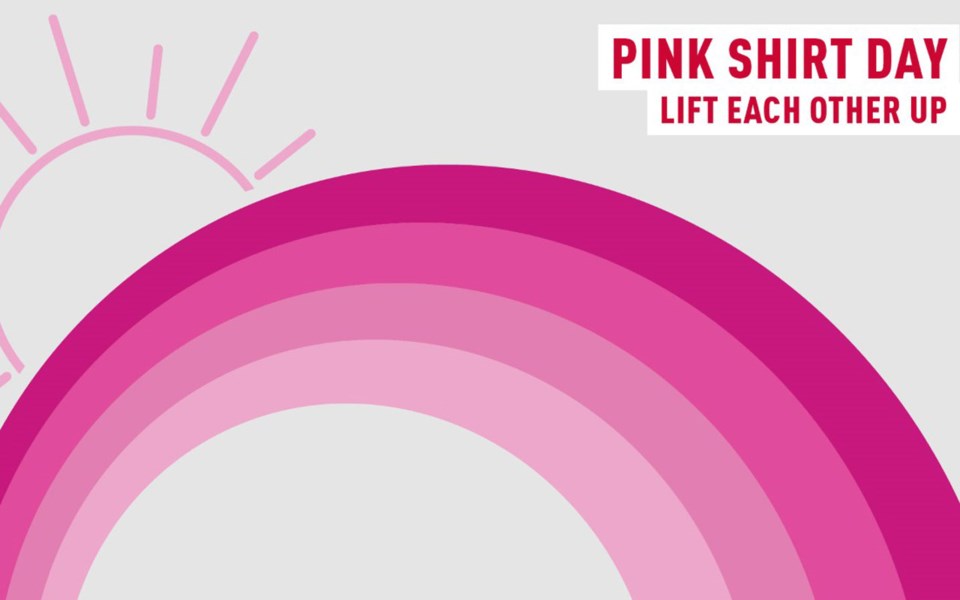Lift each other up.
That is the message of this year’s annual Pink Shirt Day campaign, which was marked across Canada, including right here in Whistler at our schools and elsewhere, on Feb. 24.
The message resonates even more strongly this year than perhaps it has in the past, as we continue to survive the pandemic one day at a time. We all need to lift each other up.
Even the tale of how the campaign started in 2007 will raise you up—it’s a story of how one action changed the world and it’s worth re-telling.
It all began when two students from Nova Scotia, David Shepherd and Travis Price, and their teenage friends, organized a high-school protest to wear pink in sympathy with a Grade 9 boy who was being bullied for wearing a pink shirt. To fight the bullying, they handed out 50 pink shirts to boys at their school—and today, millions wear pink to mark the day and support anti-bullying actions.
Their message captured not just the attention and hearts of other students but of other nations as well—countries from Japan to New Zealand now mark the day to help raise awareness around the issue.
Bullying is endemic globally and the rise of social media has made it much worse (just look at the toxic comments on Facebook that troll so many stories for no other reason that to blame or hurt or perpetuate an untruth). It is so easy to sit behind an avatar and cause pain to others, even though that may not always be the intent. We see it in workplaces, we see it across every walk of life from the school yard to the benches of government.
According to pinkshirtday.ca, one in five kids is affected by bullying, and over 47 per cent of Canadian parents report that their child has been the subject of bullying and cyberbullying.
Much of the bullying we see across all age groups takes the form of discrimination and harassment, sadly as heartbreaking as bullying is in children and youth realms, it is also alive and well in our adult populations.
We know it can lead to victims taking their own lives, and along the spectrum of impact, bullying and discrimination relentlessly wear down our mental health. In a good year, this is concerning. In a pandemic year, it cannot and should not be ignored.
Last month, Louise Bradley, the CEO of the Mental Health Commission of Canada, cited some recent U.S. figures in The Province that showed a 70-per-cent increase in cyberbullying in the past few months.
“Cyberbullying was an exploding phenomenon before the advent of lockdown and shelter in place. The threat it poses now is even greater,” Bradley wrote.
“As a society that is relying on technology as a veritable lifeline, we can’t turn a blind eye to the risks lurking everywhere from schoolroom chat boards to TikTok.”
In a pandemic, kids, youths—indeed, I would argue all of us—are cut off from many of the ways we would normally cope with bullying or discriminatory behaviour: Namely sharing the story with a friend and getting support, or being able to get away from the behaviour in a lockdown.
Yes, there are great places to get help here in Whistler and elsewhere, but even the act of reaching out feels beyond some people right now.
One of the worst forms of bullying for youth is sextortion and it, too, is on the rise.
Surrey RCMP reported that in 2020, pre-COVID-19, it recorded about 32 cases, then in the second quarter of last year, that was up to 77 cases and from July to September, there were another 45 cases. The victims ranged in age from 12 years old to 30.
Speaking recently to the Vancouver Sun, Jennifer Charlesworth, B.C.’s representative for children and youth said of the often-tech-savvy kids in lockdown, “They want to be liked, they want to have friends, but they’re not able to participate in the typical kinds of social activities that all of our children need.
“There are online predators who are extremely sophisticated, using everything from Instagram to other forms of social media. And so we are concerned about young people being groomed for exploitation, and they’re being encouraged to share photos, and then nude photos and whatnot. And then the depth of shame is profound.”
It is hard to read statements such as Charlesworth’s, but knowledge is power. So when your kids come home from school, talk about bullying, and if your co-worker seems down, check in and see if they need a hand.
Let’s lift each other up wherever we can.




